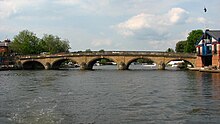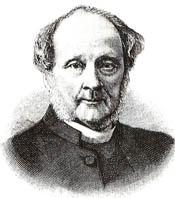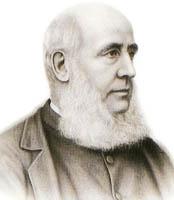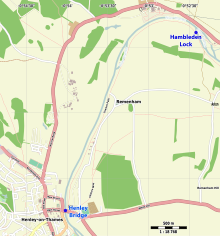| 1st Boat Race | |||
|---|---|---|---|
 Henley Bridge, the finish of the 1st Boat Race Henley Bridge, the finish of the 1st Boat Race | |||
| Date | 10 June 1829 (1829-06-10) | ||
| Winner | Oxford | ||
| Margin of victory | "easily" | ||
| Winning time | 14 minutes 30 seconds | ||
| Overall record (Cambridge–Oxford) | 0–1 | ||
| Umpire | Cyril Page (Oxford) John Stuart Roupell (Cambridge) | ||
| |||
The 1st Boat Race took place at Henley-on-Thames on 10 June 1829. The race came about following a challenge laid down to the University of Oxford by University of Cambridge "to row a match at or near London, each in an eight-oared boat during the ensuing Easter vacation". Oxford wore dark blue jerseys while Cambridge wore "white with pink waistbands". In front of a crowd estimated to be around 20,000, and according to the official record, Oxford won the race "easily" in a time of 14 minutes 30 seconds. The Boat Race became an annual fixture, and as of 2022, has been contested 167 times.
Background
Eight rowing had been popular at the University of Oxford for a number of years before a club was established at the University of Cambridge around 1827. At a meeting of the Cambridge University Boat Club in February 1829, it was decided to challenge Oxford "to row a match at or near London, each in an eight-oared boat during the ensuing Easter vacation". The race was deferred to the summer, as rowing did not start at Oxford until after Easter, and scheduled for 10 June 1829 for a prize of 500 guineas. During the pre-race betting, Cambridge were the favourites to win the race.
Oxford wore a dark blue check outfit for the race, while Cambridge wore white with pink waistbands. The two boats were said to be "very handsome, and wrought in a superior style of workmanship" by The Morning Post; Oxford's green boat was built by Stephen Davies and Isaac King of Oxford, and was slightly the shorter, measuring 44 feet (13 m). Cambridge's pink boat was 18 inches (0.46 m) longer, and built by Searle of Westminster. The umpires for the race were Mr Cyril Page (for Oxford) and Mr John Stuart Roupell (for Cambridge). Should the umpires disagree about any aspect of the race, they had recourse to consult the referee, whose name was not recorded.
Crews
The Cambridge crew weighed an average of 11 st 1.75 lb (70.5 kg); as the records for the Oxford crew are incomplete, no average weight can be calculated.

 Oxford's Charles Wordsworth (left) and Cambridge's Charles Merivale (right) both rowed at number four for their respective university.
Oxford's Charles Wordsworth (left) and Cambridge's Charles Merivale (right) both rowed at number four for their respective university.
| Seat | Cambridge |
Oxford | ||||
|---|---|---|---|---|---|---|
| Name | College | Weight | Name | College | Weight | |
| Bow | A. B. E. Holdsworth | 1st Trinity | 10 st 7 lb | J. Carter | St John's | |
| 2 | A. F. Bayford | Trinity Hall | 10 st 8 | E. J. Arbuthnot | Balliol | |
| 3 | C. Warren | 2nd Trinity | 10 st 10 | J. E. Bates | Christ Church | |
| 4 | C. Merivale | Lady Margaret Boat Club | 11 st 0 lb | C. Wordsworth | Christ Church | 11 st 10 lb |
| 5 | Thos. Entwistle | Trinity Hall | 11 st 4 lb | J. J. Toogood | Balliol | 14 st 10 lb |
| 6 | W. T. Thompson | Jesus | 11 st 10 lb | T. F. Garnier | Worcester | |
| 7 | G. A. Selwyn | St John's | 11 st 13 lb | G. B. Moore | Christ Church | 12 st 4 lb |
| Stroke | W. Snow (P) | Lady Margaret Boat Club | 11 st 4 lb | T. Staniforth (C) | Christ Church | 12 st 0 lb |
| Cox | B. R. Heath | Trinity | 9 st 4.75 lb | W. R. Fremantle | Christ Church | 8 st 2 lb |
| Source: (P) – boat club president (C) – crew captain | ||||||
Race

The course for the race was a 2.25-mile (3.62 km) stretch of the River Thames between Hambleden Lock and Henley Bridge. Cambridge won the toss and elected to start on the Berkshire side of the river, handing the Buckinghamshire side to Oxford. According to the author William Fisher MacMichael, "it was as fine a day as our climate allows a June day to be." The race had originally been scheduled to start at 6:00 p.m. but this was altered to 7:00 p.m. and was further delayed. Upon the start of the race, by which time around 20,000 people were reckoned to be in attendance to watch, the Oxford boat was steered close to the Cambridge boat, forcing it to row close to the shore. This drew complaints from the Cambridge crew, who insisted that the race be restarted. The Oxford crew relented, and the race began for the second time at 7:55 p.m. In the early stages of the race, the two crews were evenly matched, but after they passed an island in the river, Oxford drew ahead.
Once they had passed the island, and were in the main flow of the river, the Oxford crew demonstrated their strength. The Morning Post report of the race records that both crews "put out the strength of their arms in excellent style", and although the Cambridge boat maintained a higher stroke rate, Oxford maintained their lead throughout the rest of the race. Their margin of victory is variously reported as being between two and four lengths (although is recorded officially as "easily"), in a time reported variously between 14 minutes and 14 minutes 30 seconds.
Legacy
The event, subsequently referred to as The Boat Race, or the University Boat Race, was held for a second time seven years later, in 1836 on the River Thames. It was then held intermittently until the 1856 race, after which it became an annual event, interrupted only by the First, and Second World Wars and the COVID-19 pandemic. As of 2021, 166 Boat Races have been contested; Cambridge lead overall with 85 victories to Oxford's 80, excluding the one "dead heat" recorded in the 1877 race.
References
Notes
- ^ "Boat Race – Origins". The Boat Race Company Ltd. Archived from the original on 27 October 2014. Retrieved 20 April 2014.
- ^ MacMichael, p. 37.
- MacMichael, pp. 33–34.
- "Sporting Intelligence". Leamington Spa Chronicle. 30 May 1829. p. 4. Retrieved 6 April 2015 – via British Newspaper Archive.
- "Grand Rowing Match". Berkshire Chronicle. 13 June 1829. p. 3. Retrieved 6 April 2015 – via British Newspaper Archive.
- ^ "The Grand Rowing Match at Henley". The Morning Post. 15 June 1829. p. 3. Retrieved 6 April 2015 – via British Newspaper Archive.
- "Oxford 1829 Boat". National Historic Ships. Archived from the original on 13 April 2015. Retrieved 11 April 2015.
- Burnell, p. 49.
- Drinkwater, pp. 11–12.
- Drinkwater, p.13.
- Dodd, p. 286.
- Burnell, p. 51.
- Burnell, p. 50.
- ^ MacMichael, p. 34.
- MacMichael, p. 36.
- ^ "Grand Rowing Match between the Oxonians and Cantabs". The Morning Chronicle. 13 June 1829. p. 4. Retrieved 6 April 2015 – via British Newspaper Archive.
- ^ "Boat Race – Results". The Boat Race Company Limited. Archived from the original on 12 July 2016. Retrieved 8 April 2015.
Bibliography
- Burnell, Richard (1979). One Hundred and Fifty Years of the Oxford and Cambridge Boat Race. Precision Press. ISBN 978-0-9500638-7-4.
- Dodd, Christopher (1983). The Oxford & Cambridge Boat Race. Stanley Paul. ISBN 978-0-09-151340-5.
- Drinkwater, G. C.; Sanders, T. R. B. (1929). The University Boat Race – Official Centenary History. Cassell & Company, Ltd.
- MacMichael, William Fisher (1870). The Oxford and Cambridge Boat Races: From A.D. 1829 to 1869. Deighton.
External links
| The Boat Races | |||
|---|---|---|---|
 |  | ||
| |||